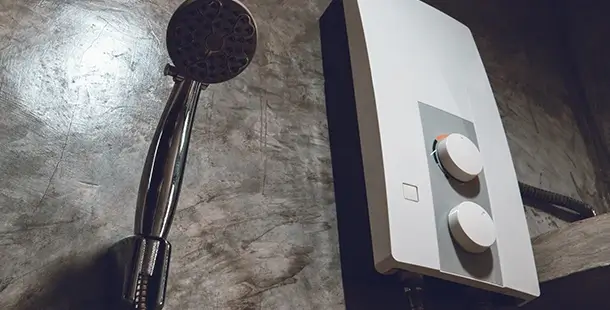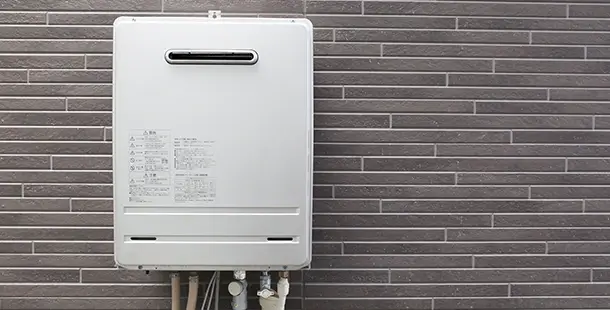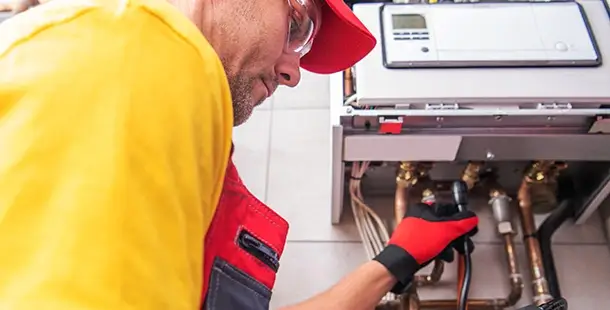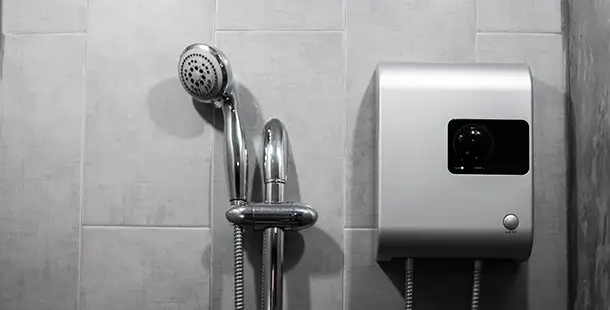Tankless Water Heater Installation & Repair
Tankless water heaters are cool. Very Space Age — much cooler than that rusting behemoth in your garage.
Tankless water heaters are also hot. Everybody seems to want one, and there are several good reasons for it.

Benefits of a Tankless Water Heater
- On-demand, near-instant hot water
- Virtually unlimited supply of hot water
- Superior energy efficiency vs. conventional units
- Long appliance life — nearly twice as long as water heaters with tanks
- Reduced maintenance costs
- Small size; flexible installation options, including outdoors
Orange Coast Plumbing installs, services, and repairs all types of tankless water heaters, including:
- Gas heaters
- Electric heaters
- Propane heaters

How a Tankless Water Heater Works
A tankless water heater has high-powered burners to heat water as it passes through a series of coils or tubes.
This is unlike tank-style water heaters, which store hot water until you use it and must cycle on and off to maintain the stored temperature.
Tankless water heaters offer near-instant hot water — no more waiting for the shower to warm up — and they seldom run out of hot water unless you place unusual demands on the system.
Tankless Water Heater Installation: Almost Anywhere!
Conventional tank-style heaters are big and bulky. By necessity, they’re installed out of the way in a basement, attic, or garage. Hot water may travel through 50 feet or more pipe before reaching the kitchen or bathroom.
Tankless water heaters are small enough to fit under a kitchen sink or next to a bathtub. They’re installed close to the point of use, reducing energy loss and wait time for hot water.
Many homeowners install their tankless heaters outdoors, attached to a wall near the bathroom.

Tankless vs. Tank Water Heaters
- Tankless models typically use 30-50% less energy than tank-style systems.
- Tankless heaters use less water, too, since they’re installed close to the shower or kitchen sink.
- Conventional water heaters may last 8-10 years. Tankless models last up to 20 years.
- Tankless water heaters don’t rust out or host colonies of sulfur bacteria.
- Tankless heaters have more precise temperature control.
Are you ready to go from the Stone Age to the Space Age of hot water? Contact Orange Coast Plumbing today for a free tankless water heater installation estimate!
We’ll discuss the pros and cons and help you select the right model for your home.

Frequently Asked Questions about Tankless Water Heaters
Do tankless heaters deliver "instant" hot water?
No, not exactly, though the hot water seems instant in comparison to the water from a conventional tank heater. Tankless heaters warm water to 120 degrees F (the safe upper limit) almost instantly, but that water still has to travel a short distance from the heater to your shower or faucet.
Their main benefits are that they’re small enough to be installed almost anywhere, and they can heat water on demand. Therefore, hot water arrives much sooner, and you rarely run out of it (unless you’re simultaneously running several hot water appliances and a hot water shower.
Why aren't tankless water heaters more popular?
Tankless water heaters have a higher upfront investment. Including installation, they can cost three times more than conventional water heaters. However, tankless models help you save money on energy in the long run.
Are tankless water heaters safe?
Yes. Most have advanced safety features and sensors that shut off gas or electricity if there’s a problem. Precise temperature controls reduce the risk of scalding.
What kind of maintenance do tankless heaters require?
Tankless water heaters need occasional descaling to remove calcium deposits from the pipes, or a professional may flush out the system once a year.
Can bacteria grow in a tankless water heater?
It’s possible but less likely than with a tank-style water heater. Tankless models are flushed regularly and heated on demand, so bacteria have little or no chance to grow. Also, many tankless heaters have an automatic cleaning cycle that prevents mineral buildup.
Can I install a tankless heater myself?
No, it requires specialized knowledge and skill to work with electricity, gas, and plumbing systems safely. Orange Coast Plumbing has certified technicians experienced in installing tankless water heaters.
What are the most common problems with tankless water heaters?
The most common issues are poor water pressure, a clogged burner assembly, and insufficient electrical power, all of which require a maintenance check. Other problems include incorrect gas pressure, improper installation, and a bad vent system.
How much space do tankless water heaters take up?
Tankless models are about the size of a suitcase and can be installed just about anywhere — under sink cabinets, attics, garages, closets, etc. They’re much smaller than conventional tanks, so they don’t take up much space.
Are tankless water heaters efficient in cold climates?
Yes. If correctly sized for the cold climate, tankless water heaters are efficient because they don’t need to maintain a large hot water tank.
Do I need to buy a new gas line to install a tankless water heater?
Maybe. Tankless water heaters require larger gas lines than tank-style models, so you may need to upgrade your existing gas line.
Are there any rebates for installing a tankless water heater?
Some energy companies offer rebates when you install a tankless system. Check with your local utility company for available incentives or programs.
Does it cost more to install an electric or gas-powered tankless water heater?
Electric models are usually more expensive to install because they require complex electrical wiring. Gas tankless systems can be installed without extensive rewiring, although you may have to upgrade your gas line.
For more information or to schedule an appointment, please call us today.
